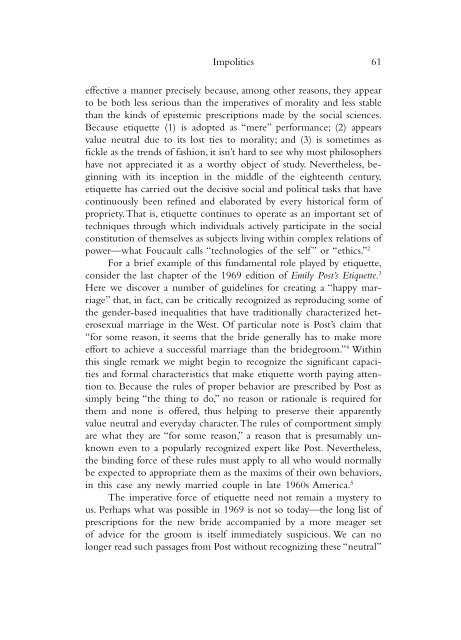You also want an ePaper? Increase the reach of your titles
YUMPU automatically turns print PDFs into web optimized ePapers that Google loves.
Impolitics<br />
effective a manner precisely because, among o<strong>the</strong>r reasons, <strong>the</strong>y appear<br />
to be both less serious than <strong>the</strong> imperatives <strong>of</strong> morality and less stable<br />
than <strong>the</strong> kinds <strong>of</strong> epistemic prescriptions made by <strong>the</strong> social sciences.<br />
Because etiquette (1) is adopted as “mere” performance; (2) appears<br />
value neutral due to its lost ties to morality; and (3) is sometimes as<br />
fickle as <strong>the</strong> trends <strong>of</strong> fashion, it isn’t hard to see why most philosophers<br />
have not appreciated it as a worthy object <strong>of</strong> study. Never<strong>the</strong>less, beginning<br />
with its inception in <strong>the</strong> middle <strong>of</strong> <strong>the</strong> eighteenth century,<br />
etiquette has carried out <strong>the</strong> decisive social and political tasks that have<br />
continuously been refined and elaborated by every historical form <strong>of</strong><br />
propriety. That is, etiquette continues to operate as an important set <strong>of</strong><br />
techniques through which individuals actively participate in <strong>the</strong> social<br />
constitution <strong>of</strong> <strong>the</strong>mselves as subjects living within complex relations <strong>of</strong><br />
power—what Foucault calls “technologies <strong>of</strong> <strong>the</strong> self ” or “ethics.” 2<br />
For a brief example <strong>of</strong> this fundamental role played by etiquette,<br />
consider <strong>the</strong> last chapter <strong>of</strong> <strong>the</strong> 1969 edition <strong>of</strong> Emily Post’s Etiquette. 3<br />
Here we discover a number <strong>of</strong> guidelines for creating a “happy marriage”<br />
that, in fact, can be critically recognized as reproducing some <strong>of</strong><br />
<strong>the</strong> gender-based inequalities that have traditionally characterized heterosexual<br />
marriage in <strong>the</strong> West. Of particular note is Post’s claim that<br />
“for some reason, it seems that <strong>the</strong> bride generally has to make more<br />
effort to achieve a successful marriage than <strong>the</strong> bridegroom.” 4 Within<br />
this single remark we might begin to recognize <strong>the</strong> significant capacities<br />
and formal characteristics that make etiquette worth paying attention<br />
to. Because <strong>the</strong> rules <strong>of</strong> proper behavior are prescribed by Post as<br />
simply being “<strong>the</strong> thing to do,” no reason or rationale is required for<br />
<strong>the</strong>m and none is <strong>of</strong>fered, thus helping to preserve <strong>the</strong>ir apparently<br />
value neutral and everyday character. The rules <strong>of</strong> comportment simply<br />
are what <strong>the</strong>y are “for some reason,” a reason that is presumably unknown<br />
even to a popularly recognized expert like Post. Never<strong>the</strong>less,<br />
<strong>the</strong> binding force <strong>of</strong> <strong>the</strong>se rules must apply to all who would normally<br />
be expected to appropriate <strong>the</strong>m as <strong>the</strong> maxims <strong>of</strong> <strong>the</strong>ir own behaviors,<br />
in this case any newly married couple in late 1960s America. 5<br />
The imperative force <strong>of</strong> etiquette need not remain a mystery to<br />
us. Perhaps what was possible in 1969 is not so today—<strong>the</strong> long list <strong>of</strong><br />
prescriptions for <strong>the</strong> new bride accompanied by a more meager set<br />
<strong>of</strong> advice for <strong>the</strong> groom is itself immediately suspicious. We can no<br />
longer read such passages from Post without recognizing <strong>the</strong>se “neutral”<br />
61
















